The CCES education program delivers athlete-centered, values-based clean sport education to Canadian athletes and stakeholders.
Clean Sport

Clean Sport is a term used internationally, harmonized by WADA’s 2021 International Standard for Education (ISE). The term refers broadly to sport that is rooted in values and principles. It is not strictly defined in the ISE, which allows for individual countries and anti-doping organizations to interpret the term in a culturally relevant way.
In Canada, this means that the values are at the heart of our education programs. The CCES defines clean sport as:
Sport in which participants actively practice the values of fairness, excellence, inclusion and fun and is free of doping, both because participants choose not to dope and because they have the knowledge, tools, and motivation to protect themselves from unintentional doping.
Our education program works in service of the goal of creating clean sport for Canadians – promoting the practice of one’s values and cultivating the learner’s knowledge, use of tools, and personal motivation to create clean sport where they live, play and compete.
Values-Based Education
In the sport context, we define values-based education as an educational approach that places the development of an individual’s personal values and principles at the heart of their sport experience. It prioritizes the development of the learner’s ethical literacy and builds their capacity to make decisions based on moral reasoning.
What does values-based education do?
- Supports learners to make a positive difference in their sport and in their community by purposefully aligning their decisions and actions with core values and principles;
- Increases users’ confidence in their personal competency and ability to take action based on their moral reasoning;
- Encourages learners to make decisions consistent with their personal values and principles, while building a sense of accountability to self and others;
- Creates informed and capable sport participants for whom doping is totally untenable;
- Models prosocial values and principles until such time as learners are able to evaluate and articulate their own values and principles, derived from their personal experience and their learning about the lived experiences of others; and
- Ensures and promotes the inclusion of all learners, irrespective of background.
How do we implement values-based education?
The CCES approaches values-based education as a four-stage process:
Foundation
LTD stages: Active Start, FUNdamentals, Learn to Train
Focus: core values and principles, such as fair play, fun, respect and inclusion.
Learners are expected to be able to articulate and practice these basic values.
Prevention
LTD stages: Learn to Train, Train to Train, Train to Compete
Focus: establish core knowledge and good practices that will protect young athletes’ health and safety as well as produce good sport.
Learners' personal experience inform their practice, and additional values become important, including the pursuit of personal excellence and development of physical and mental health.
Intervention
LTD stages: Train to Compete, Train to Win
Focus: combat misinformation, reinforce core concepts and encourage athletes to maintain clean and principled practices.
Learners develop their own principle-driven, values-based decision-making framework to help them make better choices in their sport and in their lives.
Activation
LTD stages: Train to Win, Active for Life
Focus: knowledge and understanding, plus motivation and tools to put that learning into practice.
Learners can apply anti-doping rules to their sport experience, and actively protect themselves from doping violations. They practice and promote good sport.
These Long-Term Development in Sport and Physical Activity (LTDSPA) stages are defined by Sport for Life.
Ethical Literacy
We define ethical literacy as the ability to collect and evaluate information, reflect on one’s own moral values, identify the potential outcomes of various options and their impacts, make reasoned decisions about which option(s) align with one’s values, act consistently with one’s values, explain one’s decisions, and take responsibility for one’s actions.
Resource: Ethical Literacy Banner
Who Do We Educate?
The Canadian Anti-Doping Program (CADP) requires the following athletes to be educated annually on clean sport topics via our online learning program:
- Athletes in the National Athlete Pool (NAP)
- Athletes in the CCES Registered Testing Pool (RTP)
- Athletes who receive Government of Canada funding through the Athlete Assistance Program
- The support personnel working with those athletes – members of the athlete’s integrated support team – are also expected to be educated on clean sport topics.
- Student-athletes in U SPORTS and Canadian Collegiate Athletic Association (CCAA)
- Canada Games participants
For more information on requirements, visit the Online Learning page.
Domestic Partners
We also work closely with domestic partners to provide customized education programs. For example:
- The Canadian Academy of Sport and Exercise Medicine (CASEM) offers CCES anti-doping education to its members.
Professional Leagues
The CCES provides professional leagues with customized education programs. For example:
- The Canadian Football League (CFL), a non-CADP anti-doping program.
- The Canadian Premier League (CPL), which is the only professional league in Canada to adopt the Canadian Anti-Doping Program.
The CCES can apply its knowledge, values focus, and instructional/program design expertise to programs for major games, other anti-doping organizations, international federations and more. We invite you to contact us regarding a customized clean sport education program.
What education activities do we provide?
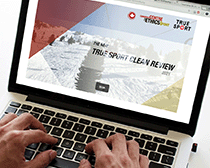
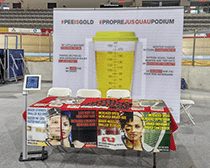
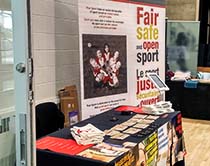
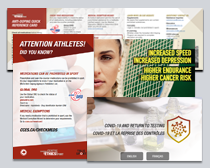
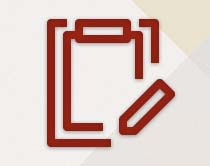
Customized Education Programs
We can apply our experience to help you promote clean sport in your program.
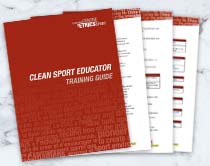
Training and Certification
If you want to join us in delivering education, become a Clean Sport Educator.